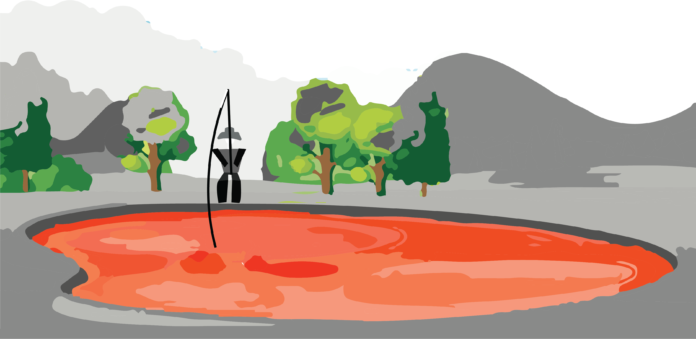Wait, what? Slow down, Mr. Trump
Like many Breaking Bad fans, I found the new film sequel, “El Camino,” to be unnecessary but satisfying. It was nice to finally see Jesse realize his dream of starting a new life in Alaska, a seed that was planted back in the original series. Unfortunately, Jesse may not have long to enjoy the natural beauty up there — not if President Donald Trump has anything to do with it.
I say this because Trump now has an unholy trinity of major policy proposals to his name that would forever destroy three of the largest and most pristine ecosystems on the planet. Trump has opened the Arctic National Wildlife Refuge (ANWR) for oil drilling, revived the proposed Pebble Mine near Bristol Bay — which could devastate the most valuable salmon fishery in the world — and most recently, he opened the Tongass National Forest to logging and development. Sorry, Jesse.
Each of these decisions is harmful and shortsighted enough on its own, but together they make for a particularly nasty batch of cynical Trumpian environmental vandalism. Just how stupid and reckless are we talking here? Well, this is stupidity as measured on a log scale. For simplicity’s sake, and in keeping with the spirit of simple-mindedness, I’ll go in chronological order.
ANWR is about 19 million acres of pure nothingness, but the size of North Carolina. Pristine wilderness untouched by development; the last place of its kind in the United States. ANWR, also known as “America’s Serengeti,” was created by President Eisenhower in 1960 and has been protected ever since. But this is now at risk because Senator Lisa Murkowski (R-AK) snuck a measure into the GOP’s 2017 Tax Cuts and Jobs Act, of all places, that mandates oil drilling in ANWR. In a very poor choice of words, Senator Murkowski giddily said that this was a “watershed” moment for Alaska. Yes, it is a watershed moment in that it will likely destroy several watersheds.
Where there is oil drilling, there are oil spills, and this is bad news for the 700 plant and animal species, not to mention the many indigenous people who rely on this robust ecosystem. North America’s largest caribou herd, which has between about 120,000 and 200,000 caribou, could be adversely affected by oil spills and the construction of roads and other infrastructure. But at least the oil lobby will be happy with almost 12 billion barrels of oil! Sucks to be a caribou!
Meanwhile, in the southwest portion of Alaska, near Bristol Bay, the Nushagak and Kvichak watersheds “produce nearly half the world’s sockeye salmon.” A massive proposed open-pit mine, referred to as Pebble Mine, however, could destroy the fishery’s long-term viability. Bristol Bay supports an average annual run of about 37.5 million sockeye salmon, and the Obama EPA estimated that the salmon fishery supports about 14,000 full and part-time jobs and produces about $480 million in revenue per year. The mine would only create about 1,000 to 2,000 jobs for it’s short lifespan.
Unfortunately, the Trump Administration reversed the Obama-era decision to block the mine, which would be about two miles wide and 2,000 feet deep and produce about 80 billion pounds of copper, 107 million ounces of gold and 5.6 billion pounds of molybdenum, worth an estimated $350 billion. Obama’s EPA, however, determined that the adverse impacts on fish populations would be “significant.” About 10 billion tons of waste from the mine could destroy 94 miles of streams and 5,350 acres of wetlands, ponds and lakes and remove about 35 billion gallons of water from the watershed per year. This would permanently devastate a sustainable fishery for short term profits and temporary jobs, even though polls show that most Alaskans oppose the mine.
And now to the Alaska panhandle, where Trump’s Department of Agriculture is proposing to allow logging in a 9.4 million acre section of the Tongass National Forest that was previously protected by President Bill Clinton under the 2001 Roadless Rule. 165,000 old-growth acres and 20,000 young-growth acres could be clearcut. And these trees don’t just provide valuable habitat, they also sequester incredible amounts of carbon. Sucks to be anyone or anything impacted by climate change!
So in summary, Jesse Pinkman isn’t gonna have much luck if he hoped to live out his days as a peaceful fisherman up in pristine Alaska, so he’d better start rediscovering his meth-cooking chops. Fast.
Written by: Benjamin Porter— bbporter@ucdavis.edu
Disclaimer: The views and opinions expressed by individual columnists belong to the columnists alone and do not necessarily indicate the views and opinions held by The California Aggie






Ridiculous. I’ve been to all 3 places, many times. None of them will be harmed as a consequence of human activity.
Uninformed opinion piece that uses likening of an illegal narcotic manufacturing television show to that of Alaska’s citizens while pushing an unnecessary environmentalist agenda. The only thing you got right is that a druggie lives in Alaska, because they actually have a huge drug problem up there and it’s no laughing matter. Not like their poverty rate has anything to do with it though, right? Surely, the jobs that the aforementioned will create won’t help the situation. No, let’s go right on living inside our own television-induced bubble and think of Alaska as a playground instead of an opportunity to better it’s citizens.
Disgusting.